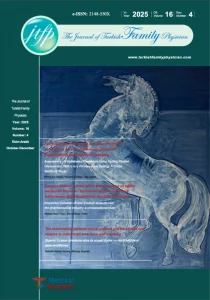The Quality of life and aging perceptions in the elderly: Baskent University example
Aging is a continuous and universal process that is seen in every living thing without privilege and causes a decrease in all our functions. In the past 40-50 years, the most important concept that has developed with the increase of the elderly population in the world, especially in developed countries, is the aging of societies. Quality oflife (QOL) was defined by the World Health Organization Quality of Life (WHOQOL) Group as “individuals’ perception of their position in life in the context of culture and value systems in which they live, and in relation to their goals, expectations, standards and concerns”
In this study, it was aimed to evaluate the quality of life perception and aging perception of elderly patients who applied to family medicine outpatient clinics of a university hospital. The data of this descriptive and cross-sectional study, the questionnaire containing socio-demographic information, and the Turkish version of WHO’s Quality of Life Instrument Older Adults Module (WHOQOL-OLD)-TR and WHO’s Europe Attitudes to Aging questionnaire. (EAAQ)-TR were created. The questionnaires were applied to Baskent University Hospital Family Medicine outpatient clinics and 200 randomly selected volunteers over the age of 65.All scale dimension scores were compared according to demographic characteristics by statistical t-test and variance analysis.
As a result, significant positive correlations among the dimensions of QOL and aging attitude (AA) were obtained. Also total scores of QOL and AA were significantly correlated.Moreover QOL dimension scores were significantly correlated to AA dimension scores. Whereas age and gender were significantly related to psychosocial loss dimension, education was significantly related to psychosocial growth, physical change and total aging attitude scores. Additionally higher educated subjects (university degree) had higher mean scores. The presence of a disease was significantly related to physical change and total aging attitude scores. (p< 0.005) Changes in living environments were significantly correlated to physical change dimension. There is a significant positive correlation between WHOQOL-OLD-TR total scores and AYTA-TR total scores.
Increasing the quality of life of the rapidly increasing elderly population will be one of the most important goals in the field of health both today and in the future. Family physicians can provide a better primary health care service by evaluating the quality of life and aging perceptions of the elderly and contribute to the development of new policies in this difficult issue.
References
- İstatistiklerle Yaşlılar 2012, Türkiye İstatistik Kurumu Yayını, Ankara. http.//www.tuik.gov.tr. adresinden 10.03.2020 tarihinde erişilmiştir.
- Quinn Km, Laidlaw K, Murray LK. Older peoples’ attitudes to mental ilness. Clin Psychol Psychother 2009;16:33-45.
- Eser S, Saatli G, Eser E, Baydur H, Fidaner C. Yaşlılar için dünya sağlık örgütü yaşam kalitesi modülü WHOQOL-OLD: Türkiye alan çalışması Türkçe sürüm geçerlilik ve güvenilirlik sonuçları. Türk Psikiyatri Dergisi 2010; 21(1):37-48.
- Aydın S, Karaoğlu L. Gaziantep il merkezinde yaşayan yaşlıların yaşam kalitesi düzeyi ve etkileyen faktörler. Turkish Journal of Geriatrics 2012;15(4):424-35.
- Özyurt BC, Tunç B, Hatipoğlu S. Yaşlıların yaşlılıkla ilgili tutumları: Manisa’da bir kentsel ve kırsal Bölge örneği. Akademik Geriatri Dergisi 2013;5(1):29-37.
- Eser E, Eser S, Ozyurt BC, Fidaner C. Türk yaşlıları örneğinde yaşam kalitesi algısı: WHOQOL-OLD Projesi Türkiye odak grup sonuçları. Turkish Journal of Geriatrics 2005; 8 (4): 169-83.
- Saygun M, Eser E. Yaşlılık Döneminde algılanan sağlık ve yaşamın niteliği; neredeyiz? “Yaşlı Sağlığı: Sorunlar ve Çözümler” içinde. (Eds) Aslan D, Ertem M. Ankara, HASUDER Publishing, 2012-1. ISMN:978-975-97836-1-7.



